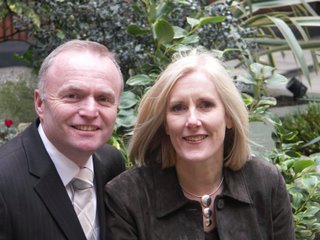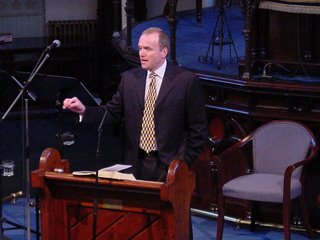 Today we continue with the fourth part of my interview with Greg Haslam, pastor of Westminster Chapel in London (pictured here with his wife, Ruth). The previous three parts of this interview included an introduction to Greg and his ministry, on leaving Newfrontiers for Westminster Chapel, and Haslam on the primacy of preaching.
Today we continue with the fourth part of my interview with Greg Haslam, pastor of Westminster Chapel in London (pictured here with his wife, Ruth). The previous three parts of this interview included an introduction to Greg and his ministry, on leaving Newfrontiers for Westminster Chapel, and Haslam on the primacy of preaching.
Adrian
Yesterday we spoke of the remarkable advance for church unity that your preaching conference represented. Despite the unity displayed in your conference and book, there were surely doctrinal differences that divided your collection of speakers, and even more issues that separate the rest of the Church. You obviously decided that you could work with a wide range of people. How do you weigh different issues on which you disagree, and decide which differences are important enough that you would not want to share a platform with someone?
Greg
Having a big heart for the unity God is looking for helps greatly (see John 17 and Ephesians 4:1-16). I suppose that order distinctions are helpful here: first-order truths and second-order truths. We cannot compromise the former, and we can learn to live with the latter. The first category includes the reality of an infinite-personal God, the Trinity, the deity of Christ, and the Holy Spirit, as well as the doctrines of salvation, atonement, regeneration, adoption, justification, sanctification, and glorification. The latter includes denominational differences, ecclesiology, styles of worship, church order, and eschatology. Meldenius’ advice is good: “In all things essential, unity. In all things non-essential, liberty. In all things, charity.”
Adrian
What issues are facing the Church today where you feel you have to say you cannot work closely with someone who thinks differently to you?
Greg
Some of the things that most concern me are the ever present realities and influence of liberal theology and the attractions of Roman Catholicism in its worst forms. Recent controversies over penal substitution and the atonement are due to a rehash of 19th century liberalism as if this battle had never been fought before. I can be cordial with such people and make bridges so that the Gospel can be heard, but I wouldn’t like to pretend or give the impression that our differences are minor, for they are not. I’m also alarmed by our frequent willingness to bed down with “the spirit of the age” and ignore the fact that this is the “Age of the Spirit.” We are never more relevant than when we obey the Holy Spirit’s leadings and declare the Bible in all of its raw power.
Adrian
How should the Christian approach people who take these views?
Greg
In humility that we were once deceived about the truth ourselves, and charity that has a care and compassion for those who are presently misled. We needn’t be humble or apologetic about the truth itself, though, nor muted in voicing what we really think. It is nasty and negative polemics we should avoid. But we should be very clear about where we stand on controversial issues.
Adrian
Given the doctrinal disputes and the press coverage about shrinking church attendance, are you depressed about the future of the Church in the UK?
Greg No, I am not depressed about the future of the Church anywhere. Christ wins! The Church will still be here when everything else has gone. The best days of Church history lie ahead of us. Worldwide revivals will sweep the continents. Many have already happened or begun. This is the “Age of the Spirit,” and “The Holy Spirit will never allow the blasphemy to be voiced against his name that he was unable to convert the world!” (C. H. Spurgeon). I am at heart a great optimist where the Gospel and the work of God is concerned. Setbacks are never permanent, only temporary. Britain is in a state of apostasy at this time, and culpable for her rejection of history, the Bible, and the honor of Christ, and for her contempt for Christ’s people. But this is no problem for God to remove and reverse. It’s what I’m praying, preaching, and working for. “Of the increase of Christ’s government and peace, there shall be no end” (Isaiah 9).
No, I am not depressed about the future of the Church anywhere. Christ wins! The Church will still be here when everything else has gone. The best days of Church history lie ahead of us. Worldwide revivals will sweep the continents. Many have already happened or begun. This is the “Age of the Spirit,” and “The Holy Spirit will never allow the blasphemy to be voiced against his name that he was unable to convert the world!” (C. H. Spurgeon). I am at heart a great optimist where the Gospel and the work of God is concerned. Setbacks are never permanent, only temporary. Britain is in a state of apostasy at this time, and culpable for her rejection of history, the Bible, and the honor of Christ, and for her contempt for Christ’s people. But this is no problem for God to remove and reverse. It’s what I’m praying, preaching, and working for. “Of the increase of Christ’s government and peace, there shall be no end” (Isaiah 9).
Adrian
I am glad to hear it! What are your hopes and dreams for the UK church in the next decade or so?
Greg
I long for several key things:
- A recovery of the Gospel.
- A renewed faith in the inspiration and authority of Scripture.
- An increase in the honor of the Holy Spirit and his work to glorify Christ.
- An increase in the number of healthy churches and church plants everywhere.
- A respect and reception of Ephesians 4 ministries, increasing unity in the true Body of Christ.
- Massive missional emphasis in the churches.
- Genuine Holy Spirit reformation, renewal, restoration, and revival in the lives of the people of God . . . all fired by an “eschatology of victory,” not an “eschatology of escapology” which the Left Behind series of novels seems to have generated!
Continued in part five, “Greg Haslam on Being Reformed and Charismatic”
To find out more about Greg Haslam, visit Westminster Chapel’s website, or download mp3s of conference messages by Greg Haslam.















